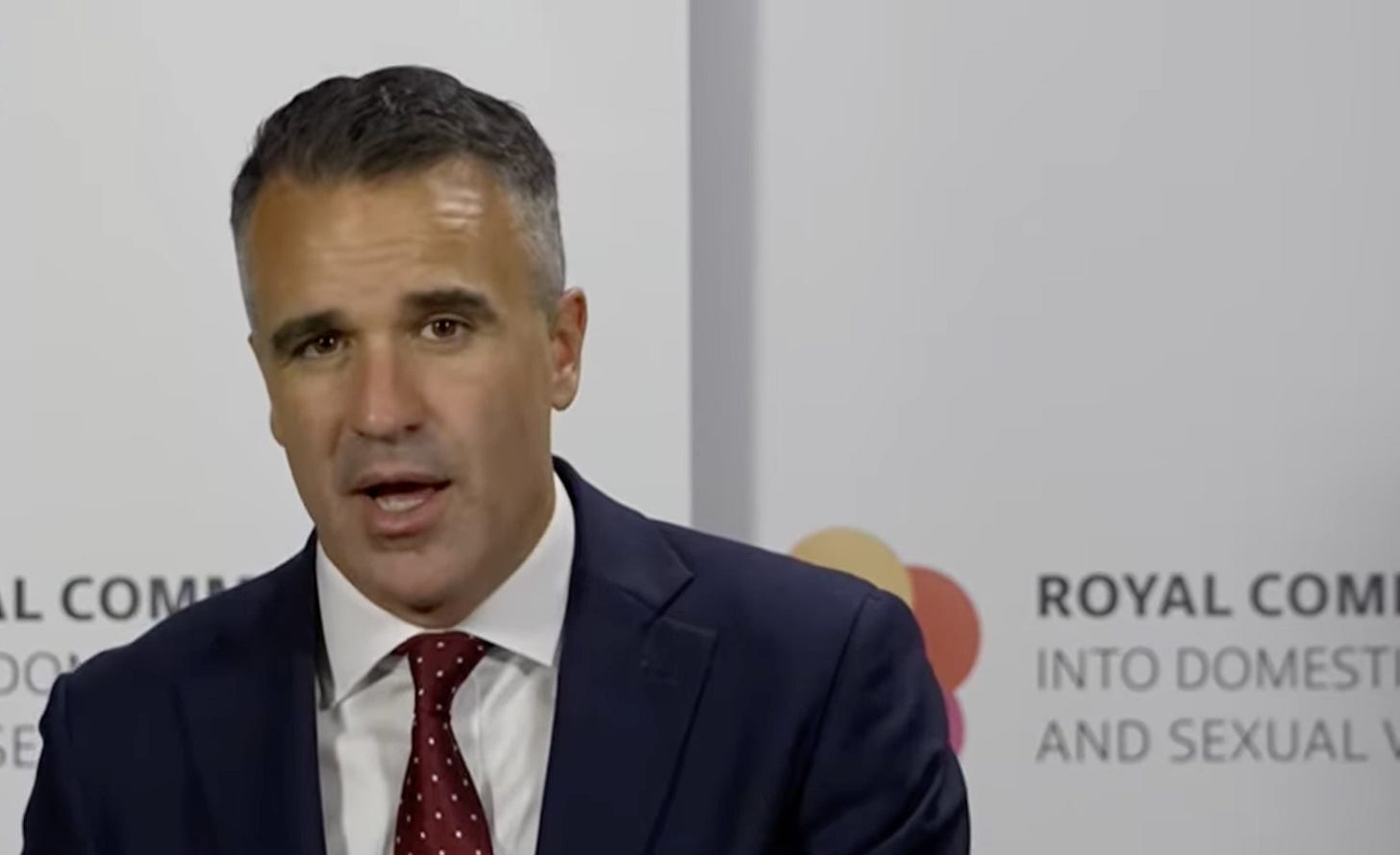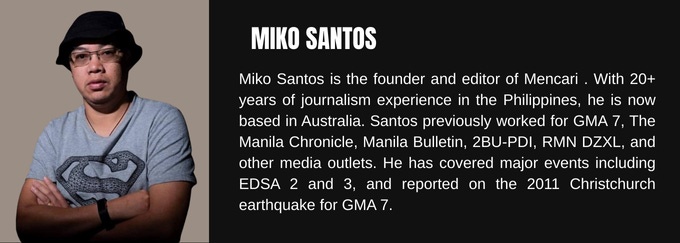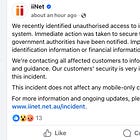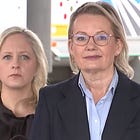South Australia Accepts Governance Reforms Following Royal Commission Into Domestic Violence
Today’s email is brought to you by Empower your podcasting vision with a suite of creative solutions at your fingertips.
The South Australian government immediately accepted seven recommendations from a landmark Royal Commission into domestic violence Monday, including establishing a standalone ministerial portfolio and governance framework to tackle what experts called a "fragmented" and "crisis-driven" system failing victims across the state.
Premier Peter Malinauskas announced the acceptance of the initial recommendations following release of the comprehensive 136-recommendation report titled "With Courage: South Australia's Vision Beyond Violence," which was triggered by four women killed in domestic violence incidents within one week in November 2023.
"Definite real progress was made in terms of security guarantees," Malinauskas said during a press conference in Adelaide. "We will be in a position to respond to the remaining 129 recommendations formally and comprehensively by year's end."
The Royal Commission, led by Commissioner Natasha Stott Despoja, conducted 173 listening sessions across the state and heard from more than 5,000 South Australians over 13 months, revealing alarming statistics about domestic violence prevalence and systemic failures in the state's response.
Crisis-Level Statistics Revealed
The report disclosed that nearly one in three South Australian women have experienced some form of domestic, family or sexual violence, while one in 30 children and young people have been affected by such violence. For Aboriginal children and young people, the rate increases to one in seven.
"In 2024, domestic violence and family violence-related offences constituted almost half of the offences against a person in South Australia," Stott Despoja said. "That's a 10% increase on the previous year. And we know police respond to more than 100 incidents a day."
The Commissioner described the current system as fundamentally broken, telling the press conference: "The Commission has found that the domestic, family and sexual violence system in this state is fragmented, it's crisis driven and it's siloed."
"There's no single point of leadership within the government for the domestic and family violence system," she said. "And without government stewardship or an accountability mechanism, no one is held responsible for when services fail people or fail to support victim survivors."
Immediate Government Response
The seven recommendations accepted immediately focus on establishing governance architecture to coordinate the state's response. These include creating a standalone ministerial portfolio for domestic, family and sexual violence, establishing a stewardship function within government, and implementing performance indicators for all chief executives.
"What they essentially do is seek to better position the government to be able to respond to the report in a formal way," Malinauskas said of the accepted recommendations.
The Premier emphasized that cross-government accountability would be mandated through chief executive contracts to prevent departments from passing responsibility to others.
"We can't have an education CEO thinking it's a police issue, a police issue thinking it's a court's issue, a court's issue thinking it's a health issue," Malinauskas said. "It's everybody's responsibility."
Truth matters. Quality journalism costs.
Your subscription to Mencari directly funds the investigative reporting our democracy needs. For less than a coffee per week, you enable our journalists to uncover stories that powerful interests would rather keep hidden. There is no corporate influence involved. No compromises. Just honest journalism when we need it most.
Not ready to be paid subscribe, but appreciate the newsletter ? Grab us a beer or snag the exclusive ad spot at the top of next week's newsletter.
Standalone Ministerial Portfolio
Stott Despoja explained the rationale for separating domestic violence response from the women's portfolio, saying the issue extends beyond gender-specific concerns despite women and children being disproportionately affected.
"This is not a women's issue, it is a whole of government, whole of community responsibility," she said. The new ministry would cover "prevention, early intervention, intervention, support services, recovery, healing."
Minister Katrine Hildyard, who currently holds the women's portfolio including domestic violence prevention, said the changes represented "a once in a generation opportunity for our state to address the issue of domestic family and sexual violence in a way that we haven't before."
Funding Implications and Timeline
While declining to specify exact amounts, Malinauskas acknowledged significant funding would be required, referencing Victoria's multi-billion dollar investment in similar reforms following their Royal Commission approximately five years ago.
"That number won't dictate the policy response either," Malinauskas said. "If we form a view that there needs to be more resources allocated over and above what is already provisioned, then we'll seek to do so because it's a priority."
The government has already provisioned funds within the state budget anticipating substantial costs, with Treasury conducting detailed assessments of each recommendation's financial implications.
Practical Reforms Highlighted
Beyond governance changes, the Premier identified several practical reforms the government plans to implement quickly, including establishing a 24/7 central service entry point to address fragmented service delivery that forces victims to repeatedly relive trauma.
"Women, when they're seeking to engage help from both government and non-government organisations, often have to repeat their story over and over again," Malinauskas said. "Reliving trauma through repetition that could otherwise be avoided is a pretty heartbreaking proposition."
The report also recommends reforms to alcohol delivery licensing, improved court facilities for victims, and comprehensive accommodation audits to address inappropriate emergency housing placements.
Justice System Failures
Malinauskas said the report revealed concerning practices within the judicial system that unnecessarily traumatize victims.
"The idea that domestic violence victims would be physically in the same environment as the alleged perpetrator in the lead up to a particular case or a hearing is not acceptable," he said.
Recommended changes include trauma-informed training for judicial officers and providing safe rooms for victims before court proceedings.
Learning From Other Jurisdictions
The Commission extensively studied other states' approaches, particularly Victoria's Royal Commission experience, to avoid implementation pitfalls.
"There are things that we can easily learn out of the Victorian experience, not because Victoria did anything wrong per se, but because their experience should inform ours to make sure that we get the best outcome," Malinauskas said.
Stott Despoja said the Commission examined approaches across all states and territories, adapting successful models like Western Australia's risk assessment tools and central entry points from Victoria.
Aboriginal Community Partnership
The Royal Commission established what Stott Despoja called "apparently a Royal Commission first" - an Aboriginal partnership committee co-chaired by herself and Scott Wilson from the South Australian Community Controlled Organisation Network.
"It means that any recommendations in this report that affect the delivery of services to Aboriginal people and communities have been designed by them, ensuring that they are relevant, appropriate and effective," she said.
Voices of Survivors Central
The Commission's "Voices" report, featuring anonymized accounts from survivors, proved particularly impactful for government leaders reviewing the findings.
"When you read the Voices document within this, the real experiences of families turned upside down, women, through no fault of their own, experience the most acute experiences of trauma and they paint more than a picture," Malinauskas said.
More than 1,140 people participated in the Commission's survey, with 64 witnesses testifying during 10 days of public hearings and over 380 written submissions received.
Implementation and Monitoring
The Commission recommended the Ombudsman serve as an independent implementation and impact monitor, emphasizing accountability over mere compliance.
"This is not a tick and flick exercise," Stott Despoja said. "It's not about just implementing for the sake of it. It's about getting it right."
The Commissioner stressed the need for both rapid implementation of some measures and long-term strategies spanning five to 10 years for workforce development and accommodation services.
Underserved Communities
The report identified significant service gaps for particular groups, including "a glaring lack of Aboriginal culturally safe services or Aboriginal-led services" and inadequate support for LGBTQIA+ people, those with disabilities, and culturally diverse communities.
"For children and young people experiencing violence, help seeking pathways are virtually non-existent," Stott Despoja said, despite young people being central to the Commission's consultations.
State's Lost Leadership
Stott Despoja noted South Australia's decline from previous leadership in domestic violence reform, saying "South Australia was once a leader in tackling this issue, and now we are way behind. We've lost our way."
The state lacks a current domestic violence strategy, with the previous plan expiring in 2022, making South Australia "the only jurisdiction in Australia without a strategy for domestic family and sexual violence," according to the Commissioner.
Community Responsibility
Malinauskas emphasized that addressing domestic violence requires broader community engagement beyond government action.
"If we want to stop domestic violence from being as prevalent as it is within our society, not only does this Royal Commission give us a roadmap to make some practical change, it also serves as an impetus to each and every one of us, and dare I say, particularly men, that we have a responsibility," he said.
The Premier committed to making government leaders available for ongoing questions as the community reviews the comprehensive report, acknowledging the limited time media had to examine the documents before the press conference.
The Royal Commission's work represents one of the most comprehensive examinations of domestic violence systems in Australian history, with its recommendations now forming the blueprint for what officials hope will be transformational reform in South Australia's approach to protecting vulnerable community members.
Got a News Tip?
Contact our editor via Proton Mail encrypted, X Direct Message, LinkedIn, or email. You can securely message him on Signal by using his username, Miko Santos.
Sustaining Mencari Requires Your Support
Independent journalism costs money. Help us continue delivering in-depth investigations and unfiltered commentary on the world's real stories. Your financial contribution enables thorough investigative work and thoughtful analysis, all supported by a dedicated community committed to accuracy and transparency.
Subscribe today to unlock our full archive of investigative reporting and fearless analysis. Subscribing to independent media outlets represents more than just information consumption—it embodies a commitment to factual reporting.
As well as knowing you’re keeping Mencari (Australia) alive, you’ll also get:
Get breaking news AS IT HAPPENS - Gain instant access to our real-time coverage and analysis when major stories break, keeping you ahead of the curve
Unlock our COMPLETE content library - Enjoy unlimited access to every newsletter, podcast episode, and exclusive archive—all seamlessly available in your favorite podcast apps.
Join the conversation that matters - Be part of our vibrant community with full commenting privileges on all content, directly supporting The Evening Post (Australia)
Catch up on some of Mencari’s recent stories:
It only takes a minute to help us investigate fearlessly and expose lies and wrongdoing to hold power accountable. Thanks!








